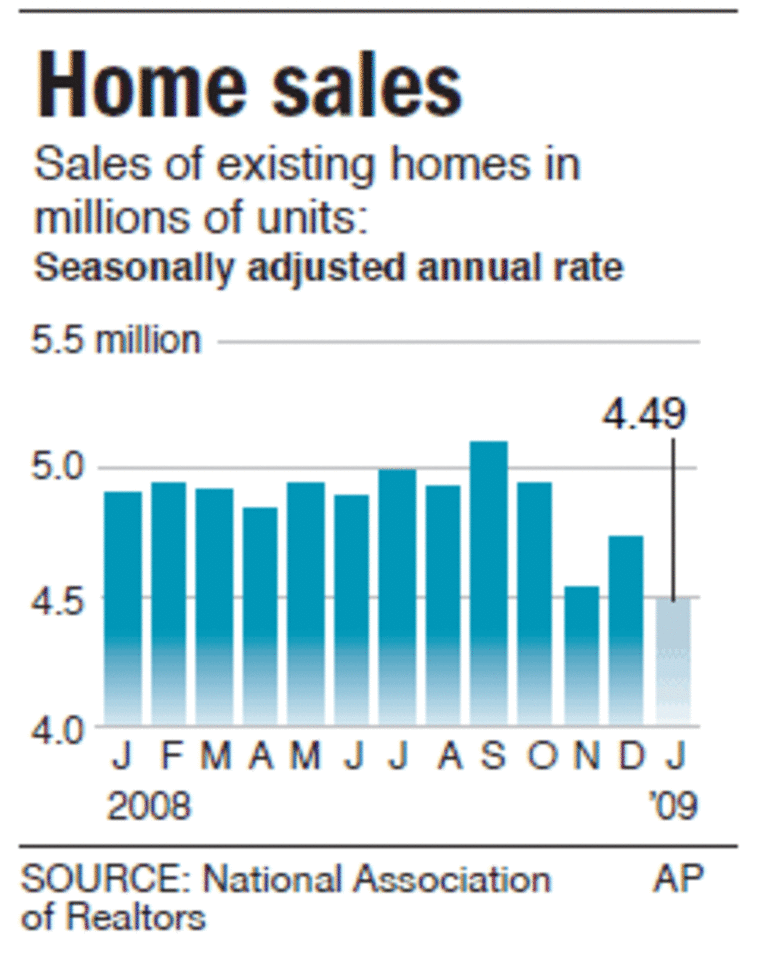Sales of existing homes unexpectedly plunged in January to the lowest level in nearly 12 years as pessimism about the economy grew and buyers waited for President Barack Obama's plan to help revive the U.S. housing market.
The National Association of Realtors said Wednesday that sales of existing homes fell 5.3 percent to an annual rate of 4.49 million last month, from 4.74 million in December. It was the weakest showing since July 1997, and some analysts don't see sales bottoming out until later this year as prices continue to sink. Sales had been expected to rise to an annual pace of 4.79 million homes, according to Thomson Reuters.
"If Americans are worried they won't have a job next month, next quarter, or next year, you've got a real problem," Mike Larson, a real estate analyst with Weiss Research, wrote in a research note.
Without adjusting for seasonal factors, sales nationwide fell 7.6 percent from a year earlier. The West was the only part of the country to show increased sales.
Sales had surged in December, providing some hope that the long-awaited housing market bottom was in sight. But economic fears are now paramount in the minds of many consumers.
The median sales price in January plunged to $170,300, down 14.8 percent from $199,800 a year earlier and from $175,000 in December. It was the lowest price since March 2003 and the second-largest drop on record.
The number of unsold homes on the market fell almost 3 percent last month to 3.6 million, the lowest inventory level in two years. But due to the slumping sales pace, it would still take 9.6 months to rid the market of all of those properties, up from 9.4 months in December.
The number of properties languishing on the market likely would be higher if sellers weren't so reluctant to list their properties as prices sink rapidly, Joshua Shapiro, chief U.S. economist with MFR Inc., wrote in a note Wednesday.
"With supply overhang still huge and mortgage financing difficult to obtain, home prices are likely to decline considerably further in the quarters ahead," he wrote.
Foreclosures have swamped the market — especially in particularly distressed states like California, Florida, Nevada and Arizona. The Realtors group estimates that about 45 percent of sales nationwide are foreclosures or other distressed properties.
That's great news for buyers, who are paying the most affordable prices in years. Another boost: the combination of low interest rates and the $8,000 first-time homebuyer tax credit tucked in the economic stimulus plan signed by Obama this month.

Treasury Secretary Timothy Geithner and Housing and Urban Development Secretary Shaun Donovan met Wednesday with housing counselors to discuss efforts to promote the tax credit for first-time home buyers. The administration said the credit should provide a significant boost to the housing industry — given that nearly one out of every two homebuyers last year were first-time buyers.
Geithner said the tax credit "gives money to taxpayers when they need it most" and should help provide an "immediate response to the current crisis."
Lawrence Yun, chief economist for the Realtors group, said the tax credit should help boost home sales by late spring or early summer. Buyers "did not want to jump into the market until they were certain" what the government would do to resuscitate the housing market and that clearly dampened January sales, he said.
Taken together with higher loan limits for mortgage finance companies Fannie Mae and Freddie Mac, the Realtors group projects that 900,000 additional home sales will result this year.
But other analysts see the stimulus providing a far more modest boost because credit standards remain tight and the economy is weak.
Patrick Newport, an economist with IHS Global Insight, said sales are likely to sink further and not stabilize until the summer. Prices aren't likely to hit bottom until the first quarter of 2010 and should remain flat for another year, he said.
"At some point, prices will drop so much that sales will start to pick up," Newport wrote in a note Wednesday. "So far, this has yet to happen."
More on |